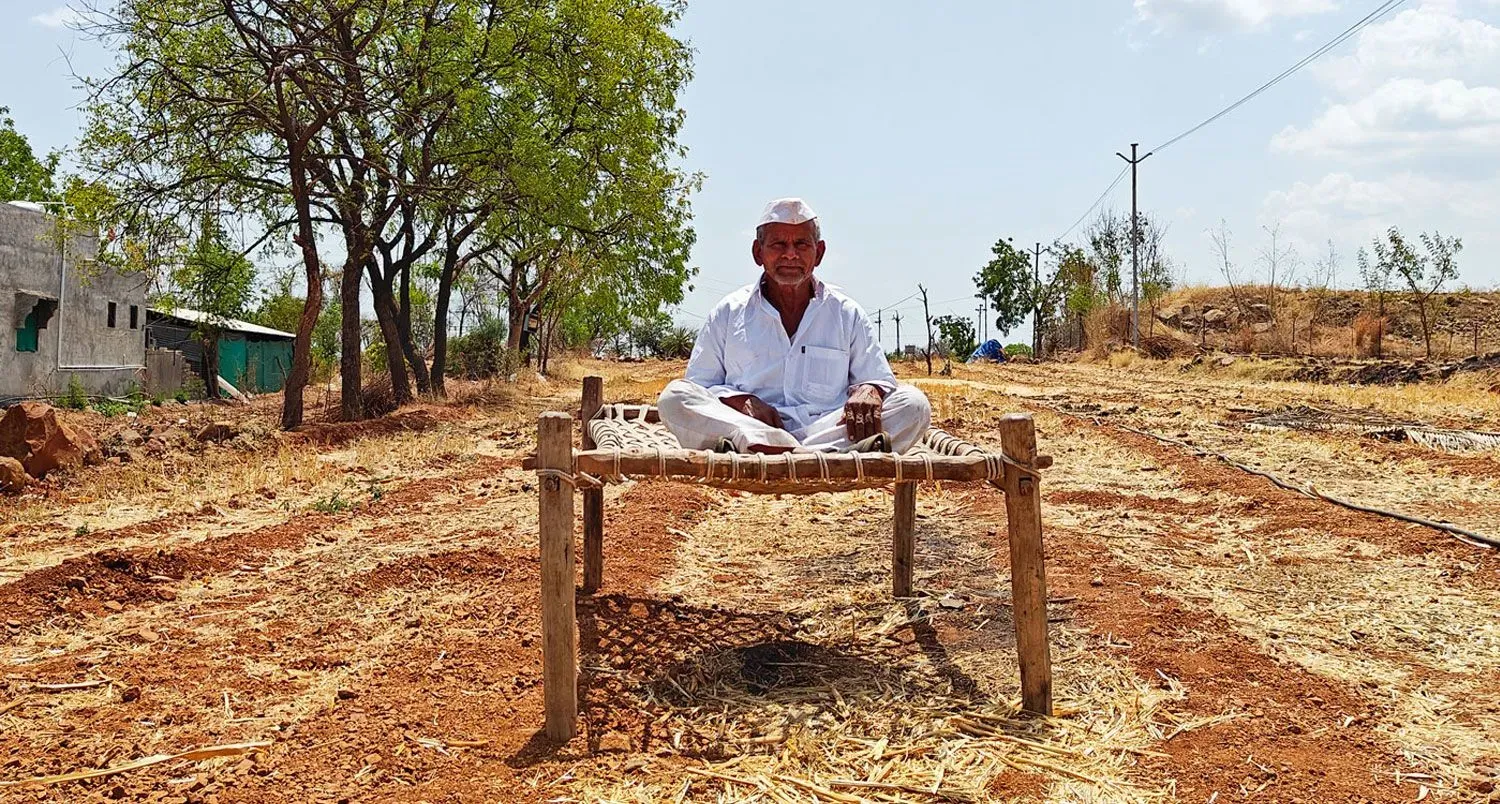
A famous temple trust in Ahilyanagar, Maharashtra state, buried golden instruments to “capture the minute energy waves from the universe to bless devotees.” It remains a popular pilgrimage spot.
Being deep in debt did not stop Keru Dahifale from hosting a feast for his entire village of Mohate in the first week of May 2025. Nearly 3,000 people turned up at the one-acre farmland in front of his tin-roofed hut and helped themselves to a massive spread of festive vegetarian food.
Cost: Rs. 1.5 lakh.
That’s the kind of money 70-year-old Dahifale does not have. So he borrowed it from a private moneylender at an interest of three per cent per month, or 36 per cent per annum. That could tighten the albatross around his neck after the disappointing winter cropping season. He had cultivated onions, but a drought saw the crop dry up and ate away his investment of Rs. 35,000.
Despite struggling to make ends meet, Dahifale never had second thoughts about hosting that feast. “Otherwise, the goddess wouldn’t bless me and grant my wishes,” he says.

As a nonprofit journalism organization, we depend on your support to fund more than 170 reporting projects every year on critical global and local issues. Donate any amount today to become a Pulitzer Center Champion and receive exclusive benefits!
Mohate village falls in the Pathardi taluka of Ahilyanagar (formerly Ahmednagar) district. Dahifale’s home is located on a curvy road descending from the famous Mohata Devi temple, a grand four-storeyed structure that was renovated between 2009 to 2013, at a cost of close to Rs. 20 crore. It is among the most popular Hindu pilgrimages in the state of Maharashtra with a footfall of 25 lakh per year.
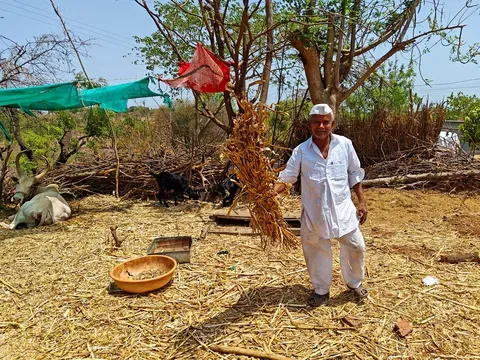
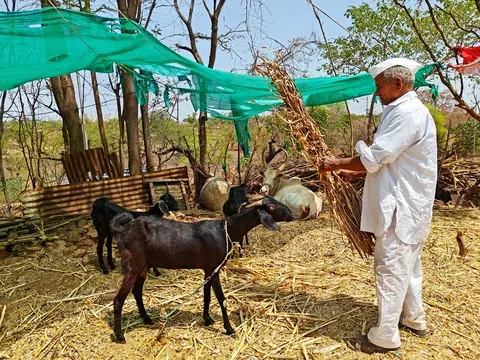
But the pilgrims pretend to be unaware of the shady past of the custodians of the goddess they worship. The godmen running the temple trust have been mired in serious controversies. The pilgrims, though, are told it doesn’t matter. The goddess of Mohata is known to bless her devotees.
Dahifale has two sons in their late thirties. Both are married and work odd jobs in different cities barely scraping by. “I hosted a feast to ensure their progress in life,” he says. “I am sure the goddess will bless them like she blessed me and my wife.”
About 30 years ago, while drawing water from a well in his village, Dahifale lost balance and fell, injuring himself so terribly that he spent a month in a coma before coming out. Two years ago, he climbed a mango tree to pluck the fruit when he lost balance and plummeted to the ground. Both accidents could have ended his life. He believes he is alive only because of the goddess.
His wife, Indu, about the same age as Dahifale, struggled with weak knees until she landed a job as a cook at the temple trust. She makes Rs. 7,000 a month for a six-day work week – just about as much as an MNREGA worker would make in Maharashtra. “She now walks two kilometers uphill to get to the temple,” he says. “If that isn’t the goddess at work, I don’t know what is.”
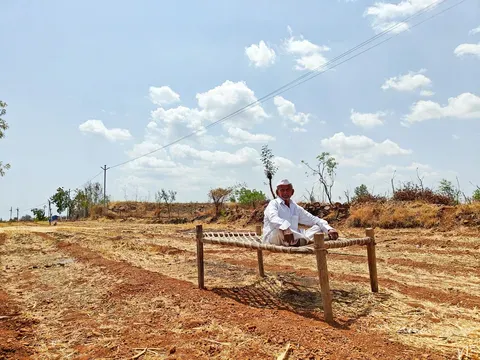
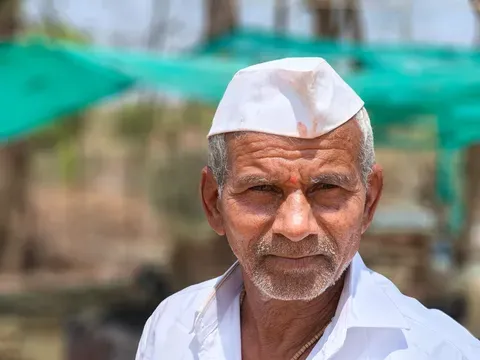
The villagers of Mohate are overwhelmingly devout followers of the Mohata goddess and every summer for four months straight, one financially struggling farming family or the other hosts a feast in her honour for the rest of the village.
Hamid Dabholkar of the Andhashraddha Nirmulan Samiti (ANIS), an organisation dedicated to eradicating superstition, says that people in general are afraid of an invisible power and want to feel protected. “The godmen who claim to be custodians of god exploit that vulnerability and lack of awareness among innocent citizens,” he says. “From a psychological point of view, some of the godmen or temple trusts externalise your problems by promising a magical remedy. It is an attractive option for which we have an inherent vulnerability that allows them to get away with fraudulent activity.”
In 2015, the Mohata temple's trust – officially known as Shri Jagdamba Devi Sarvajanik Trust – decided to bury 91 instruments carved out of gold beneath the idols. The temple’s proposal for this project declared it was to “capture the minute energy waves from the universe to bless devotees.” These energy waves would further “enhance their faith” and also the “experience of pilgrims,” which would bring “more donations to the temple.”
The proposal was approved when two people from the judiciary were on the trust. Nitin Tribhuvan, who was the judicial magistrate, and Nagesh Nhavkar, a district court judge.
The constitution of the temple trust is designed in a way that makes the district judge of Ahmednagar its chairman. Therefore, the chairman of the trust keeps changing every three years or so.
The golden instruments that were to be buried under the idols to “boost” the energies of the temple weighed nearly two kilograms, making them worth just under Rs. two crore in 2025. To carry out this task, the trust handpicked a local godman, Pradip Jadhav, who quoted Rs. 25 lakh as his fee for the task. It was approved in contravention of the trust’s own decision, which mandates a tender to be floated for any work that costs over Rs. 20,000. But the condition was ignored because the task was “exceptional.” Jadhav recited mantras over the instruments before the trust buried them.
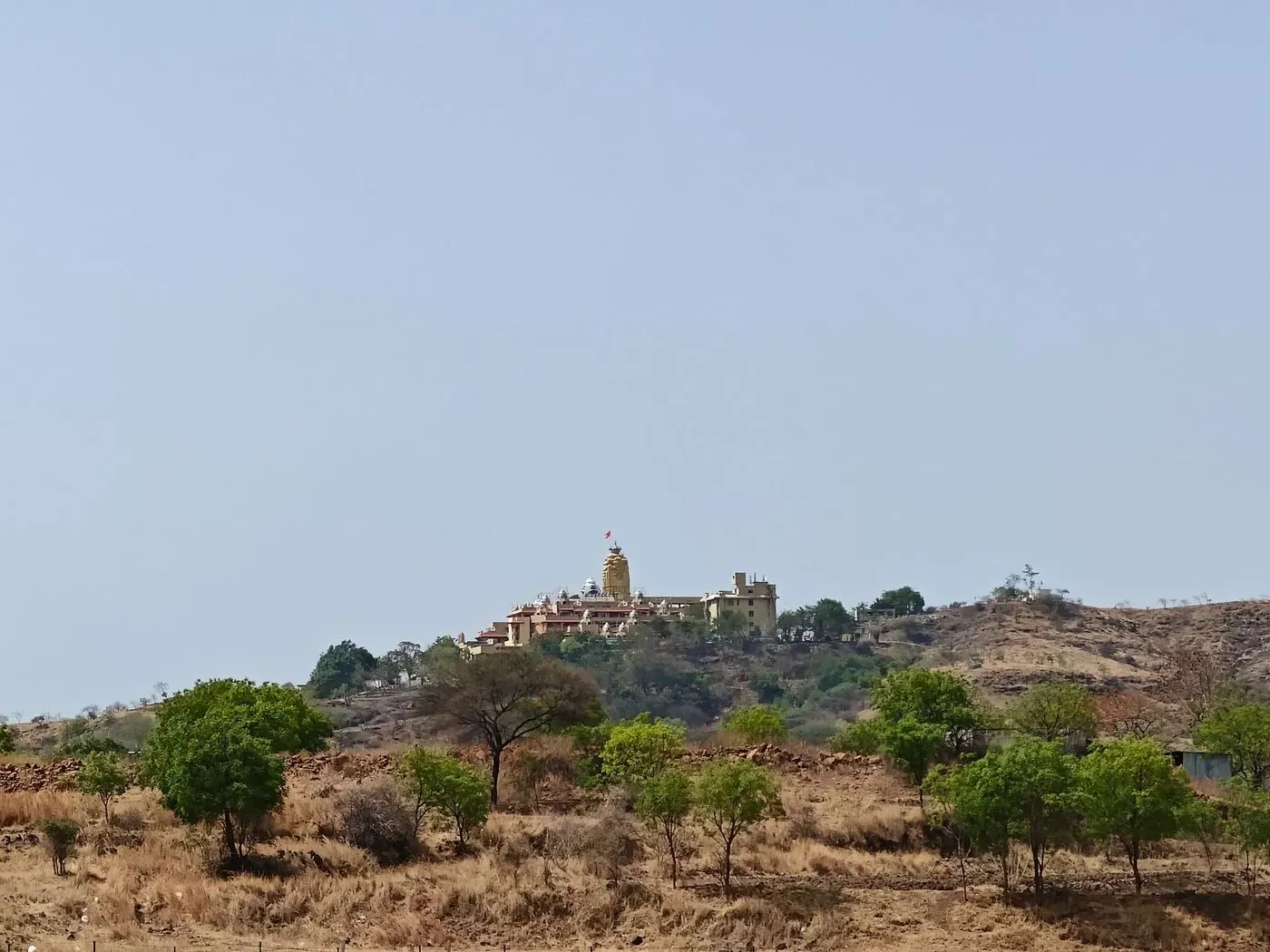
The whole process smacked of irregularities, corruption and promotion of superstition. That two members of the judiciary were part of the Trust and process, only made it worse. This was first exposed in a series of stories published in the Marathi newspaper Lokmat. It prompted ANIS to move the Charity Commissioner’s office in 2017. Just two years later, Namdev Garad, one of the trustees at the time, approached the Aurangabad Bench of the Bombay High Court to seek action against the functioning of the Trust. The court clubbed the two complaints together and ordered a police investigation in 2021.
“I noticed financial irregularities during the working of the temple trust,” says Garad, who owns two and a half acres of farmland. “It was fishy. I repeatedly raised questions about corruption during the meetings, but I was ignored. I said the devotees here are poor and marginalised people from rural areas. So I eventually decided to speak out.”
Garad, and his advocate, Harihar Garje, 44, a local of Pathardi taluka, faced a tremendous backlash, and also threats for their actions. “When Lokmat ran a series of stories, a police complaint was filed against me for defaming the temple trust and hurting religious sentiments,” says Garad. “My wife would be anxious every time I left home. The people I took on were powerful and influential. My son studied law at the time. He was taunted: ‘now you can fight your father's case.’ For a family that was never embroiled in a court case or a police matter, it was a big deal for us.”
Garad, 58, runs an educational institute in Amrapur taluka adjacent to Pathardi, and a library for poor children studying for competitive exams. The backlash prompted him to go absconding for a week or so. Locals accused him and Garje of attacking the Hindu faith. The temple trust withdrew the charges after the Aurangabad Bench ordered an investigation, Garad added.
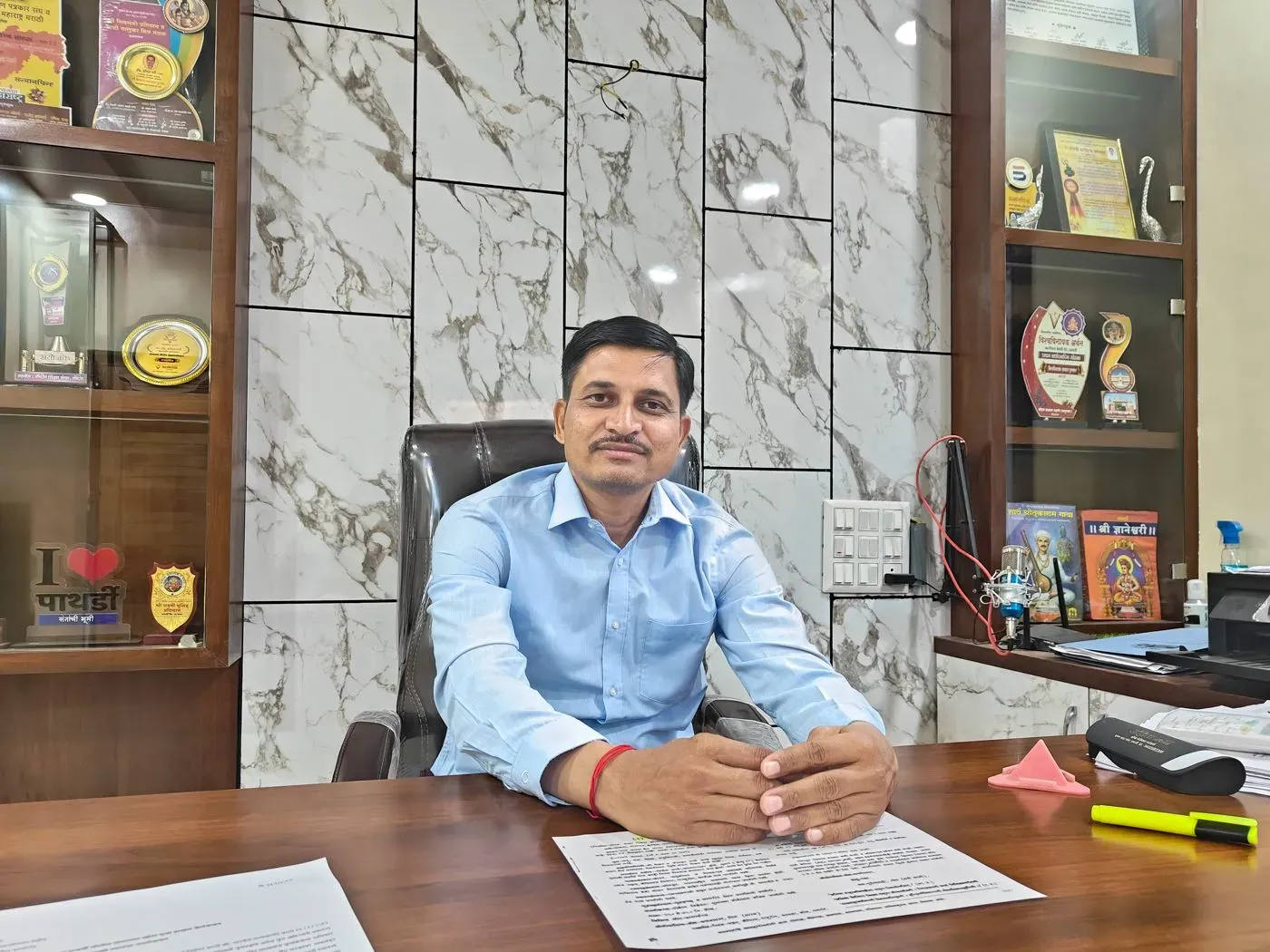
Hamid Dabholkar says rising Hindu majoritarianism allows temple trusts to seek refuge in victimhood and claim that an exposé of their fraudulent activities is an attack on the religion. “The godmen and temple trusts have always enjoyed disproportionate power in India,” he says. “But the current environment has increased their already ominous impunity.”
But, he says, the anti-superstition bill in Maharashtra leaves space to push back. Hamid’s father, Narendra Dabholkar, founder of ANIS and a pioneer of the anti-superstition campaign, fought a lifetime to make this bill a reality. In 2013, he was killed in Pune by Hindu religious fundamentalists – two of whom have since been convicted for his murder – for his activism. Soon after that, the government of Maharashtra enacted the bill, and it became a law in the state.
“The importance of the anti-superstition bill is that it comprehensively records that superstitions are not part of any religion,” Hamid said. “It has been accepted by law.”
After Garad and ANIS’ intervention, the trustees of the Mohata temple were charged under the same law, which criminalises claims of supernatural powers and the ability to perform miracles.
But the police investigation and further action has been disappointing, exemplifying the power and influence of the Mohata temple trust. Only five were arrested for committing a financial fraud and promoting superstition, including Pradip Jadhav, the godman who executed the plan to bury golden instruments. However, the two judges faced no legal consequences. Though named in the original complaint, they are not mentioned in the chargesheet.
The case is currently being heard in front of the Chief Judicial Magistrate in Ahilyanagar. Contacted by PARI, the present CEO of the temple trust Suresh Bhange says “the case is going on against the previous trustees and the trust has nothing to do with it anymore. It happened during the administration of the previous trustees. I don't know about it anymore. The temple trust is not involved anymore.”
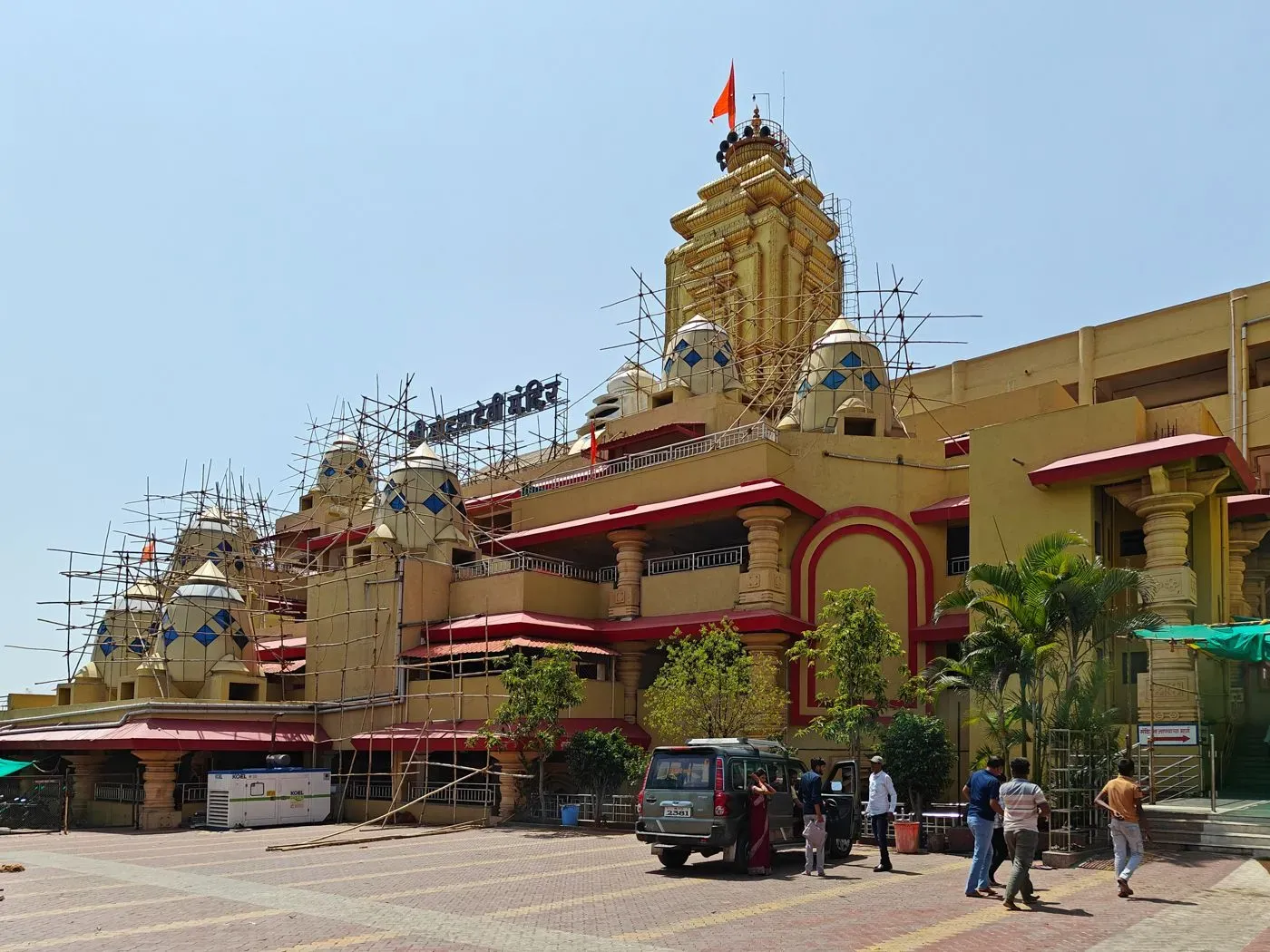
With thousands of pilgrims visiting from all over Maharashtra, the Mohata temple trust continues to amass crores of rupees from fervent devotees. It is a religious trust, which means it doesn’t pay taxes. It is not even mandated to make its account public.
For the longest time, it was a nondescript temple. But has been transformed into a commercial behemoth. Advocate Garje has seen the transformation since he was a kid. “The goddess was always popular among her devotees, who asked for divine intervention with their employment or marital status,” he says. “It is a matter of personal faith.”
But, he adds, the problem lies in exploiting that faith for commercial gain. “And the biggest concern is that a judge oversees it. Why should a constitutional position be part of a religious trust in a secular state?”
Temple trust CEO Suresh Bhange says the money is being used for several charitable purposes like providing water tankers during drought, organising community weddings, sarees to marginalised women, aid to the mentally challenged and a regular supply of free food twice a day to poor devotees. Besides, the trust set up a covid-19 centre during the pandemic, distributed groceries, medicines and testing kits.
The taluka of Pathardi that hosts the Mohata temple is also a hub of migrant sugarcane workers belonging to the most marginalised communities. For a meagre amount of Rs. 30,000-40,000 across six months, couples migrate to western Maharashtra or Karnataka to engage in one of the most gruesome forms of bonded labour in appalling conditions.
In most cases, families take their children with them at the cost of their schooling because there is nobody back home to look after them. For those children, CEO Bhange, says the temple trust has a hostel in which there are currently 124 students lodged – 80 per cent of them, children of sugarcane workers.
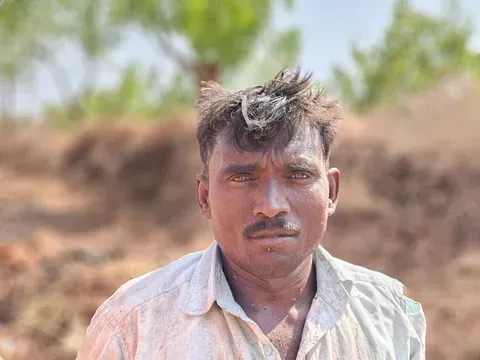
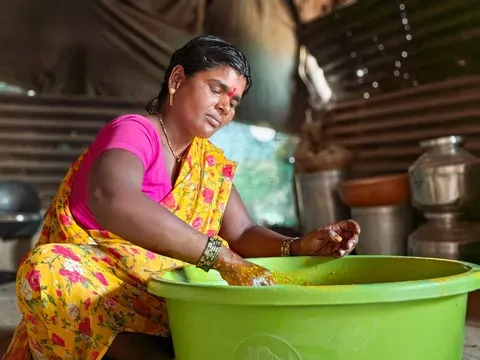
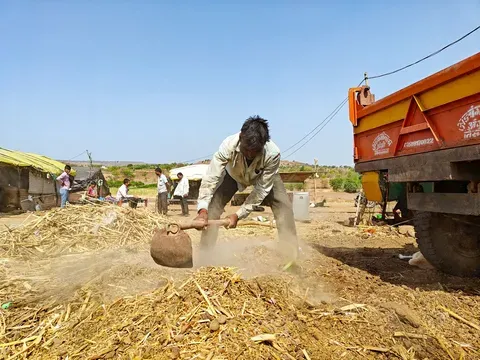
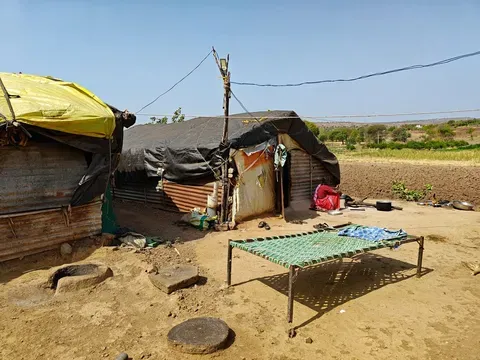
Herambh Kulkarni, an educationist and former school principal based in Ahilyanagar, says that temple trusts like Mohata could do a lot more than what they do, considering the money they amass, and it still doesn’t justify spreading superstitious beliefs. “But the focus of these religious trusts is to mint money,” he says. “No politician would dare to make that suggestion either, because he or she would be branded anti-Hindu.”
Ironically, before migrating to another region for six months, hundreds of sugarcane cutters pay a visit to the Mohata temple and seek blessings from the goddess.
Kalpana Chormale, 32, returned to her village of Karodi from her six-month grind in May 2025, and was busy gearing up for the cropping season ahead of the monsoons. Her two sons aged 14 and 13 also travelled with her and returned to Pathardi only to appear for exams. “It was tough on them,” she says. “It is difficult to study while cutting cane day in and day out. None of us are qualified to check if they have done their homework correctly or not. This is how our kids fall behind in school, and then fall behind in life.
In her dimly lit shed covered with hay on the top and tin on the sides, Kalpana, who belongs to the Dhangar community, a nomadic tribe in Maharashtra, quietly listens to her colleagues in the settlement explain how the Mohata goddess is one of the most active deities around.
Mahadev Chormale, 43, her brother-in-law, while digging up soil around their settlement, says his wife, Sharda, had a bulge behind her ear and it went away after the couple requested the goddess to take care of it. “We donate as much as we can based on our income after she blesses us,” Mahadev explains.
“Did you ask anything from the goddess?” I ask Kalpana, who is making a bucket full of mango pickle inside the hot and humid hut.
“Why burden her needlessly?” she says. “My problems are my own. Not hers to solve.”

.jpg.webp?itok=2a4G8T41)









